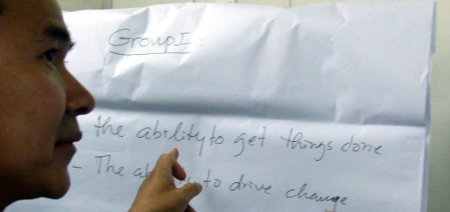Definitions and meaning in the development context

Some development agencies have taken the ideas from general meaning of the word capacity and applied them to create a definition that relates specifically to development. This is good because it starts to make the word more relevant to the development context, but there are several of them from various sources, so it is necessary to think about which works best for the context under consideration.
Examples of capacity definitions
- ECDPM: That emergent combination of individual competencies, collective capabilities, assets and relationships that enables a human system to create value.
- President Paul Kagame of Rwanda: Capacity or “the ability to get things done” goes beyond formal qualifications and technical skills development to include the cultivation of intangible or “soft” attributes such as the ability to drive change and to build processes, organizations, and institutions which can deliver public services over the long term.
- Ubels et al, Earthscan/SNV: The ability of a human system to perform, sustain itself and self-renew.
- UNDP: The ability of individuals, institutions and societies to perform functions, solve problems, and set and achieve objectives in a sustainable manner
- OECD: Capacity is the ability of people, organisations and society as a whole to manage their affairs successfully.
- WBI: The availability of resources and the efficiency and effectiveness with which societies deploy these resources to identify and pursue their development goals on a sustainable basis.
Two examples about the NGO sector are interesting because they have been created to fit to a specific group of organisations and what they need to do:
- Allan Kaplan/CDRA: The ability [of an organization] to function as a resilient, strategic and autonomous entity.
- New Zealand Council for International Development: The measure of an NGO’s ability to satisfy or influence stakeholders, consistent with its mission.
See resources for further reading below to find links to the documents that these definitions come from, with details of the sections/pages where more information can be found.
Reflection questions (for group discussion or self-study)
Everyone concerned with capacity, whatever their roles and responsibilities, needs to have a good understanding of what the word is about in their context and for the area in which they are operating. So you might find that the definitions given above are not specific enough to be particularly helpful for your context. Before going on to any of the other sections, it is worth taking some time to clarify what you and your colleagues understand about capacity.
- How would you describe the main ideas that are coming across in these definitions?
- Which words and phrases stand out as being really important for your organisation and context? Which words or phrases are not important, and why?
- In what ways does this fit with or change your previous thinking about how capacity is defined?
See also the Trainer and Facilitators’ Guide for more exercises to explore applying the ideas about capacity to your context.
Resources for further reading
The sources of the definitions given in this section are listed below. Each reference tells you where you can find the definition and more discussion about it in the document.
ECDPM (2008) Capacity Change and Performance: Insights and Implications for Development Cooperation, Chapter 3: The Concept of Capacity – introduction section on page 23. European Centre for Development Policy Management, Maastricht, 2008.
President Paul Kagame: President Paul Kagame, address to the gala dinner to celebrate the 20th anniversary of the African Capacity Building Foundation, Kigali, February 8, 2011. Office of the President.
OECD (2008) The Challenge of Capacity Development: Working Towards Good Practice. Organisation for Economic Co-operation and Development, DAC, Guidelines and Reference Series, Paris.
Ubels et al (2010) Capacity Development in Practice. Earthscan, London, 2010. See “The issue of definitions” (page 3) and “A living view on capacity” (page 5).
UNDP (2009) Capacity Development: A UNDP Primer, United Nations Development Programme Capacity Development Group, New York. See Introduction Section, p. 5, and Capacity Development Glossary, p. 53.
WBI: The Capacity Development Results Framework, World Bank Institute, Washington. See “Two essential definitions”, p. 3.
Kaplan, A (1999) The developing of capacity, Community Development Resource Association Cape Town. See page 20.
New Zealand Council for International Development (1999) Resource Kit for Working with NGOs
Next section: Capacity development